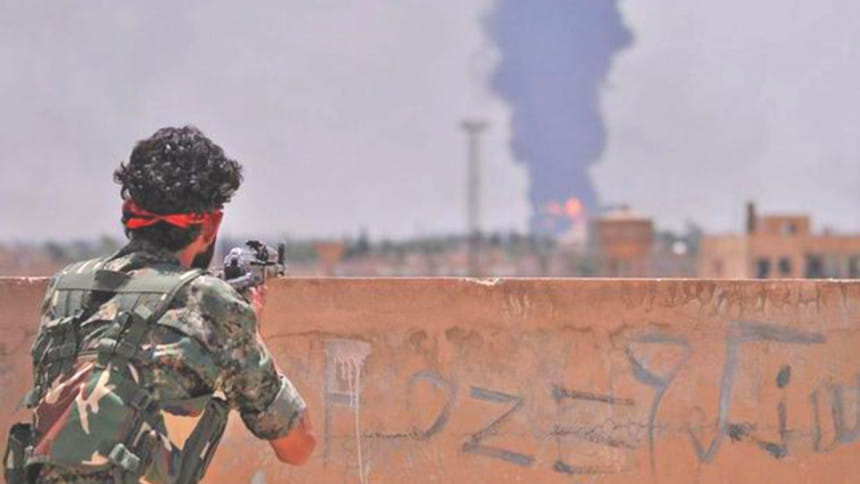Erdogan's war and US myopia

Turkish air force's latest bombing of ISIS positions in Syria, and its simultaneous bombing of Kurdish positions in northern Iraq, and its asking for a no-fly zone for Syrian air force in the border region between Turkey and Syria are both enigmatic and counterproductive for a durable peace in the sub region. As these attacks and their specious justifications are unwarranted, so are they neither surprising nor unexplainable.
However, the Obama Administration, which defied the hawkish opposition at home and abroad and signed the historic Nuclear Deal with Iran, seems to have condoned President Erdogan's military operation in Iraq. His bombing of the Kurdish forces – who have been fighting the ISIS terrorists in northern Iraq – amounts to supporting the terrorists. The US support for Erdogan's policy is astounding. As one analyst has argued, "Turkey's opportunistic decision to conflate the risks posed by the Islamic State with its three-decade conflict with Kurdish separatists could set back the broader efforts of the American-led coalition."
One may justify Erdogan's decision to bomb ISIS positions seemingly in retaliation against the apparently confirmed, recent "ISIS attacks" in Turkey. However, it is difficult to rule out the purported "ISIS attacks" as a false flag operation by the Turkish government. ISIS seems to have no compelling reasons to attack Turkey, which was a safe haven for foreign Islamist fighters who freely moved into Syria through its territory since the beginning of the Syrian civil war until the recent past.
The answer to the question as to why Turkey bombed Kurdish positions in northern Iraq is not that simple. If Turkey is genuinely interested in crushing the ISIS, it has no reasons to attack the Kurdish militias who have been the main bulwark against the ISIS in northern Iraq. However, there are convincing answers to all the above questions, and also to the question as to why Turkey wants to enforce a no-fly zone for Syrian air force across the Syria-Turkey border.
There are different versions of the stories. They are very different from what the Turkish Government is trying to tell the world since it started bombing Syria and northern Iraq last Friday, July 24th. Erdogan simply wants a safe haven for the Islamist rebels in Syria. His preference for the ISIS to the Kurdish State, as espoused by the Kurdistan Workers' Party (PKK), is not unknown.
More than 40,000 people died in the thirty-year long PKK-led rebellion (1984-2013) against the Turkish state, which denied the Kurds – between 10 and 25 percent of the population – equal rights and opportunities. The PKK is in peace with Turkey, after the PKK and the Turkish Government signed a ceasefire agreement in 2013.
After signing the agreement, the PKK slowly withdrew its fighters to the Kurdish districts of northern Iraq with a view to ending the long-drawn war with Turkey. The arrest of Abdullah Ocalan, the charismatic PKK leader in 1999, had already demoralised many PKK fighters. Although PKK has renounced violence and does not want to carve out a Kurdish state out of Turkey, Erdogan seems to be worried about the emergence of independent Kurdistan out of Kurdish territories in Iraq and Syria. The PKK has its Syrian offshoot called the People's Protection Units or YPG, which is friendly to the US and fighting against the Assad regime, but is also striving for a Kurdish homeland, free from Syrian occupation.
Erdogan seems to have allowed the US to use Turkish air bases to bomb ISIS strongholds in the region, on the condition that Washington would not restrain Turkey from attacking Kurdish forces within and beyond Turkey. The New York Times (July 27, 2015) has aptly illustrated the equation: "Having sought Turkey's greater involvement in Syria for a long time, American officials appear reluctant to criticize Turkey's bombing of the P.K.K. …. the United States played no role in the air strikes against the Kurdish group, but recognized Turkey's 'right to self-defense'."
Nevertheless, Erdogan's military operations might eventually become a costly undertaking for Turkey. While Washington and the NATO have favoured the Turkish bombing of ISIS positions in Syria, and Kurdish positions in Iraq, analysts across the board are wary about the outcome of the Turkish attacks on Kurdish territories in Iraq. If Turkey does not stop attacking the Kurds right now, the dormant Kurdish fighters are most likely to retaliate against Turkey. Ominously, both the Turkish Government and the Kurdish authorities in Turkey and Iraq declared in the wake of the Turkish attacks of Kurdish positions in Iraq that the truce was over.
As Erdogan wants to contain the PKK, so is he eager to destroy the base of the fast-rising pro-Kurdish People's Democratic Party (HDP) in Turkey. The HDP has a wider base beyond the Kurdish minority, among ethnic Turks as well. On the one hand, by breaking the truce with the PKK, Erdogan aims at crushing the PKK once and for all. By neutralising the PKK, it seems, he hopes to counterbalance the HDP support among ethnic Turks and Kurds in Turkey. While analysts considered the HDP as Erdogan's "nightmare" before the Parliamentary elections in June this year, in the wake of the elections, the Party emerged as a "menace" to the President's policies.
Erdogan's military ventures against the Kurds– if not stopped immediately – may prove problematic; and Turkey is likely to face terrorist attacks for an indefinite period. Instead of turning a blind eye to Turkey's attack on Kurdish territories in Iraq, the Obama administration must restrain the Turkish regime for the sake of a durable and just peace.
Washington should realise that Erdogan's attacks on Kurdish forces in Iraq and Turkey are likely to benefit the ISIS and other obscurantist forces in the region.
The US has a responsibility and the capability to stabilise the entire region, which, thanks to its invasions and regime-change dictum since long, is one of the most turbulent regions in the world. Instead of trying to overthrow Bashar al-Assad to make another fractured entity like Iraq or Libya out of Syria, it is time to engage Saudi, Iranian, Turkish and other regional governments to destroy the ISIS, al Qaeda and other menacing threats to peace.
The US allocated millions to train up 3,000 "secular fighters" in Syria to topple the Assad regime by the end of this year, but it has managed to train up only 60 Syrians to date at a cost of $500 million. The US has already spent a staggering $3.2 billion in its bombing campaign in Iraq and Syria – spending around $9.4 million a day – to overthrow the elusive Islamic State. Money and military hardware alone have failed to resolve any major problem in the region.
The writer teaches security studies at Austin Peay State University. Sage has recently published his latest book, Global Jihad and America: The Hundred-Year War Beyond Iraq and Afghanistan.

 For all latest news, follow The Daily Star's Google News channel.
For all latest news, follow The Daily Star's Google News channel. 



Comments